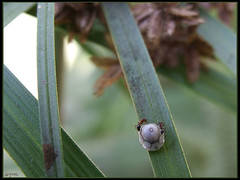Wax Scales
They’re creepy, crawly, small, and annoying. Wax scales won’t stop until they’ve destroyed every plant in the garden. Although they can be difficult to kill, wax scales can be controlled. The key is often timing and prevention, both of which may be helpful in fighting other types of harmful garden insects as well.
What are Wax Scales?
Wax scales (sometimes known as Florida wax scales) are globular, tiny insects that are covered with a heavy layer of beige or white wax. This wax often appears moist, giving the appearance that the wax is wet and difficult to handle. Plants infested with wax scales often have leaves that contain what appears to be black mold, and may develop fungi that can ultimately kill the plants. If plants are heavily-infested, wax scale control can be difficult due to the incredibly small size of the insects and their resistance to some types of pesticides. Insecticide use can be successful in fighting wax scales when it is appropriately timed, but unfortunately, many gardeners do not notice wax scale infestations after the problem has become less manageable.
Once a host plant has an abundance of wax scales infecting it, the insects will begin to spread, infesting nearby plants. Wax scales are notorious for having “hot feet”, and will often move from one location to another many times throughout their lifetimes. Female wax scales, which are more plentiful than males, will lay hundreds of eggs during their life cycles, making the bugs even more difficult to control. Wax scales will destroy a plant by extracting the plant’s interior sap, sapping it of its nutrients and overall life force. Leaf discoloration is often the main sign gardeners notice when the discover an infestation.
Wax Scales Control
If your garden has a large-scale infestation, you may find controlling these insects difficult, and you may wish to call in a professional pest control service. Maintaining plant and soil health may help to prevent such infestations however, as plants in poor health will often attract wax scales as well as other harmful insects. Regularly checking for signs of infestation is also important. Be sure to examine both sides of leaves and plant roots.
Foliage insecticides are available in some areas, and can be sprayed on leaves experiencing wax scale infestation. Some insecticides can be applied directly to the soil to kill wax scales when they arrive. These same insecticides may also be helpful in controlling other insects that are deemed harmful to plants.



